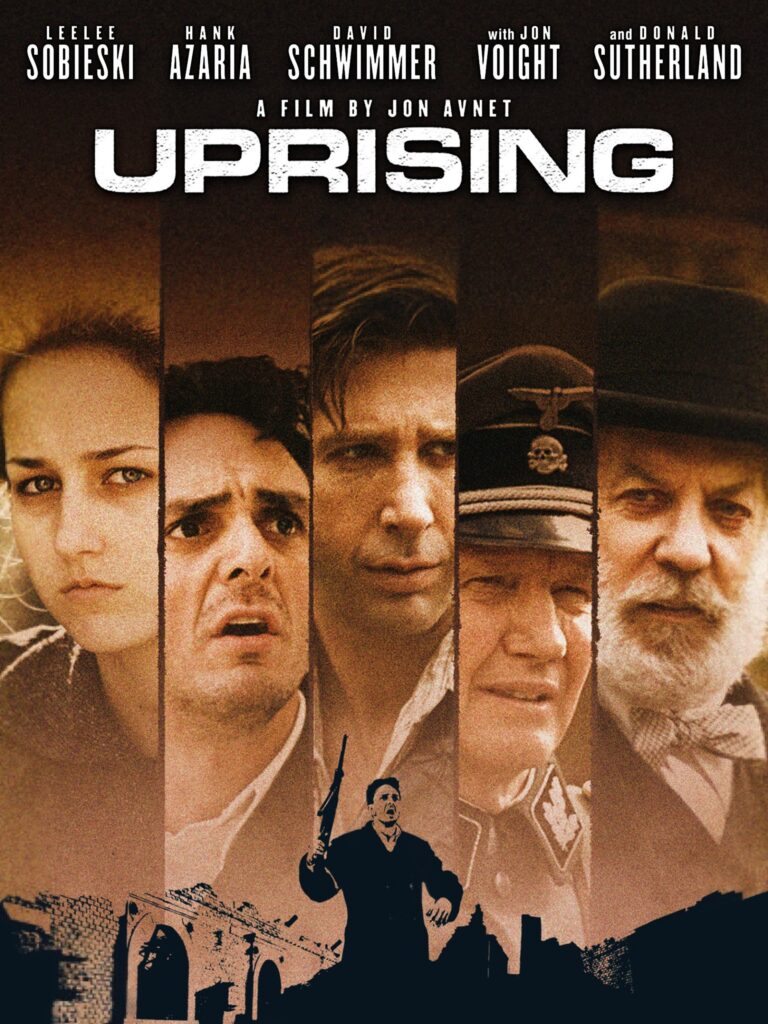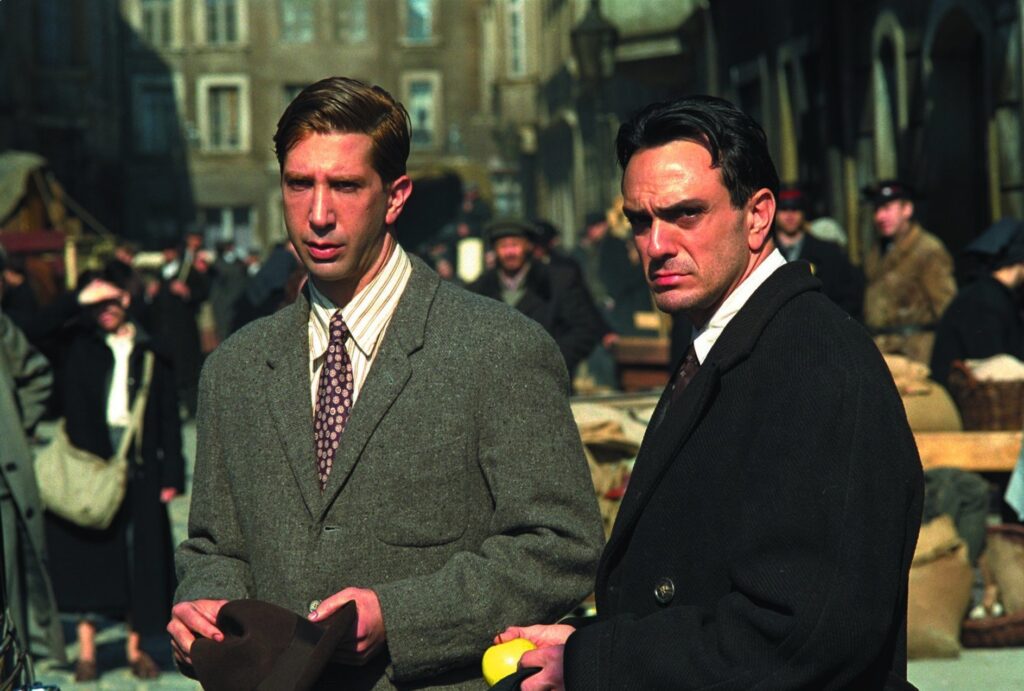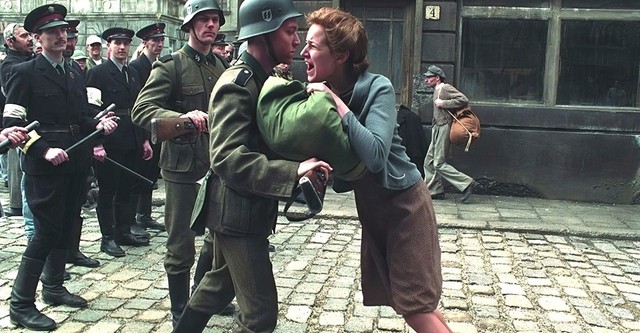Uprising (2001)

DIRECTOR: Jon Avnet
CAST: Hank Azaria, David Schwimmer, Leelee Sobieski, Stephen Moyer, Donald Sutherland, Jon Voight, Cary Elwes
REVIEW:
Uprising, an NBC TV miniseries about the Warsaw Ghetto Uprising during the Holocaust, is an attempt to bring some spotlight to the striking true story of Warsaw’s Jewish resistance, but unfortunately fails to give a true-life inspirational tale the movie presentation it deserves. Maybe a harder-hitting, grittier film could have been a better format; the restrictions of NBC and the TV movie format leaves Uprising, while earnestly well-intentioned, feeling like it soft peddles a story that shouldn’t be soft peddled.
In October 1940, a little over a year after the Nazi conquest of Poland, the Warsaw Jews are forced into the severely overcrowded Warsaw Ghetto. 50,000 per year die of starvation and disease, but this is not enough to suit SS Chief Heinrich Himmler, who decrees in 1943 that the Warsaw Ghetto be destroyed and the 450,000 inhabitants be deported to the gas chambers of Treblinka, with the goal of having Warsaw “Jew free” by April 20…Adolf Hitler’s birthday. On April 19, the first day of the Jewish holiday of Passover, 2,000 SS soldiers march into the ghetto to round up the remaining Jews. To their shock and the shock of the world, the Jews did the last thing anyone expected, least of all the Nazis…they fought back. The Warsaw Ghetto Uprising will rage for twenty-eight days as poorly armed Jewish rebels battle heavily armed SS troops for every street and every house.
The central characters of this miniseries are the leading figures of the uprising, Mordechai Anielewicz (Hank Azaria), Yitzhak Zuckerman (David Schwimmer), Simha “Kazik” Rotem (Stephen Moyer) and Tosha Altman (Leelee Sobieski). Anielewicz pleads for help from Adam Czerniakow (Donald Sutherland), the Nazi-appointed head of the Jewish Council—-a powerless puppet figurehead—-but the naive Czerniakow is too passive and submissive to actively give aid, believing any uprising would be doomed to failure and would only make things worse. For a time, Anielewicz, Zuckerman, and their followers merely survive in the Warsaw Ghetto, enduring food shortages and arbitrary Nazi cruelty, but when Himmler inspects the ghetto and orders more deportations, they realize the decisive moment has arrived when their choices have come down to either passively submitting to their fate, or fighting back.

The actors mainly do the best they can with their roles. Despite being too old for the part (he was twenty years older than the real Anielewicz at the time of filming), Hank Azaria and David Schwimmer are surprisingly effective playing against their comedic typecasting in serious straight roles, as is Leele Sobieski as Tosia, whose fair complexion (not fitting the Nazis’ stereotypical ideas of a Jew’s appearance) enables her to slip inconspicuously in and out of the ghetto. Sobieski creates an effective strong female character who can hold her own along with the men in a dangerous situation, and was nominated for a Golden Globe. Adam Czerniakow could have come across as a wishy-washy coward, but Donald Sutherland makes him more sympathetic than that, a kindly, timid man who naively believes that he can obtain better treatment for his fellow Jews by cooperating with the Nazis instead of fighting them. Arguably the standout in the supporting cast is Stephen Moyer as the fiery young Jewish fighter Kazik (the real Kazik survived the uprising and the war and went on to write his memoirs and serve as a technical adviser for this production).
Alas, while the Jewish rebels are well-played, the Nazis are one-note caricatures. There are only two of any note, the slimy Dr. Fritz Hippler (Cary Elwes), director of the Nazi propaganda film The Eternal Jew (in which Jews are compared to teeming hordes of rats), and the ruthless SS General Jurgen Stroop (Jon Voight) who is eventually handpicked by Himmler to come straighten things out when his predecessors are ineffectual at putting down the rebellion. Elwes plays Dr. Hippler with the same smarmy false charm he could play in his sleep, while Voight sleepwalks through his role as General Stroop (despite picking up an undeserved Emmy Award).

The biggest problem with Uprising is that it doesn’t make as powerful an impression as it should. The excellent drama The Pianist (probably the best Holocaust film after Schindler’s List), which also takes place in the Warsaw Ghetto and briefly depicts the Warsaw Ghetto Uprising, had genuinely jarring depictions of casual Nazi brutality, but here similar scenes somehow feel forced and cliched, as if the filmmakers were going down a checklist of every nasty thing they could think of for the Nazis to do. Schindler’s List and The Pianist are so effective and powerful because they present the Holocaust in a methodical, detached, docudrama style. Uprising feels overdramatized, in TV movie-ish fashion. The Warsaw Ghetto doesn’t seem nearly crowded enough, and the characters don’t look malnourished; whether it’s the limitations of this being a TV movie airing on NBC, Uprising has too much of a soft-peddled, “made-for-TV” appearance. The camerawork is often fast-cutting and feels less like we’re watching a Holocaust docudrama and more like we’re watching an MTV music video, sometimes resulting in a fragmented feel. The characters also occasionally spout one-liners that feel more appropriate for action heroes than for this subject matter. The battle scenes are generally well-done and do highlight the bravery and tenacity of the lightly armed Jewish civilians against the SS troops, but the weakness of other aspects undermines the overall effect.
Director Jon Avnet has stated that he wanted to make Uprising because he was tired of seeing Holocaust movies where the Jews are uniformly portrayed as helpless victims going meekly to their fate, and wished to highlight examples of heroic resistance. While a laudable intention, it is unfortunate that Uprising is only partially effectual at doing justice to their true story. It deserves credit for bringing the Warsaw Ghetto Uprising greater public awareness, but the tale of the Warsaw Jewish resistance fighters is worthy of better. Despite all the earnest intentions in the world, the overdramatization and the lack of the grittier, more realistic depictions in superior productions about the Holocaust undercuts Uprising’s success and results in an only sporadically effective miniseries with not as much impact as it should have.
* * 1/2